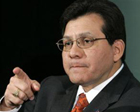| Deputy Attorney General Paul J. McNulty told congressional investigators that he had limited involvement in the firing last year of eight U.S. attorneys and that he did not choose any to be removed, congressional aides familiar with his statements said yesterday. McNulty said he provided erroneous testimony to Congress in February because he had not been informed that Attorney General Alberto R. Gonzales and his aides had been working with the White House on the firings for nearly two years, the congressional aides said. The statements Friday, during a private interview with investigators from the House and Senate Judiciary committees, make McNulty the latest senior Justice official to assert that he did not identify any of the U.S. attorneys to be fired and that his role was minimal. Gonzales, former chief of staff D. Kyle Sampson and William E. Moschella, the principal associate deputy attorney general, also told Congress they did not choose who was fired. "If the top folks at DOJ weren't the key decision-makers, it's less likely that lower-down people at DOJ were, and much more likely that people in the White House were making the major decisions," said Sen. Charles E. Schumer (D-N.Y.). Moschella was also interviewed last week. He told investigators he was solely responsible for a provision in the USA Patriot Act reauthorization law that gave Gonzales the authority to appoint U.S. attorneys for an indefinite time, a congressional aide said. Moschella also said that, when the provision was drawn up in November 2005, he was not aware of a dispute over the appointment of a U.S. attorney in South Dakota, the aide said. Justice officials have pointed to that case as a key justification for the provision, which Congress has since repealed. Democrats criticized Gonzales yesterday for giving Sampson and his White House liaison in March 2006 the authority to hire and fire certain employees. "It is disturbing to learn that the attorney general was granting extraordinary and sweeping authority to the same political operatives who were plotting with the White House to dilute our system of checks and balances in the confirmation of U.S. attorneys," said Sen. Patrick J. Leahy (D-Vt.). Administration officials said Gonzales's order, published in the Federal Register and first reported yesterday by the National Journal on its Web site, codifies a process that is standard for agencies throughout the government in dealing with political appointees. "The notion that the White House shouldn't be involved in presidential appointments is bizarre," said White House spokesman Tony Fratto. |





